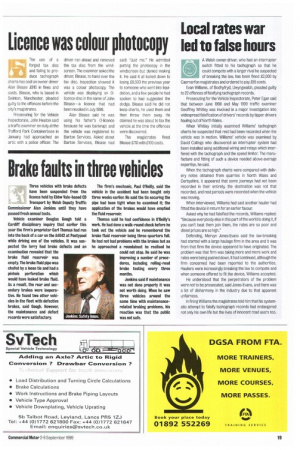A Welsh owner-driver, who had an interrupter switch fitted to
Page 21

If you've noticed an error in this article please click here to report it so we can fix it.
his tachograph so that he could compete with a larger rival he suspected of breaking the law, has been fined £2,000 by Caernarfon magistrates and ordered to pay 155 costs.
Evan Williams, of Bodhyfryd, Llwyngwalch, pleaded guilty to 22 offences of falsifying tachograph records.
Prosecuting for the Vehicle Inspectorate, Peter Egan said that between June 1998 and May 1999 traffic examiner Geoffrey Whitley was involved in a major investigation into widespread falsification of drivers' records by tipper drivers hauling out of North Wales.
When Whitley initially examined Williams' tachograph charts he suspected that rest had been recorded when the vehicle was in motion. Williams' vehicle was examined by David Collings who discovered an interrupter system had been installed using additional wiring and relays which interfered with the tachograph and the speed limiter. The manufacture and fitting of such a device needed above-average expertise, he said.
When the tachograph charts were compared with delivery notes obtained from quarries in North Wales and Derbyshire, it appeared that some journeys had not been recorded in their entirety, the destination was not that recorded, and rest periods were recorded when the vehicle was moving.
When interviewed, Williams had said another haulier had fitted the device in return for an earlier favour.
Asked why he had falsified the records, Williams replied: "Because everybody else in this part of the world is doing it, if you can't beat them join them, the rates are so poor and diesel prices are so high."
Defending, Mervyn Jones-Evans said the law-breaking had started with a large haulage firm in the area and it was from that firm the device appeared to have originated. The problem was that firm was taking more and more work and rates were being pushed down. It had continued, although the firm concerned had been reported to the authorities. Hauliers were increasingly breaking the law to compete and when someone offered to fit the device, Williams accepted.
He understood that the perpetrators of the problem were not to be prosecuted, said Jones-Evans, and there was a lot of disharmony in the industry due to that apparent unfairness.
In fining Williams the magistrates told him that his systematic attempt to falsify tachograph records had endangered not only his own life but the lives of innocent road users too.








































































































